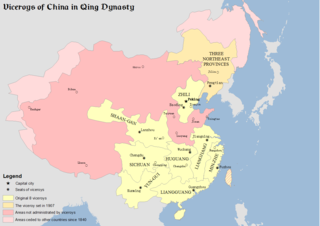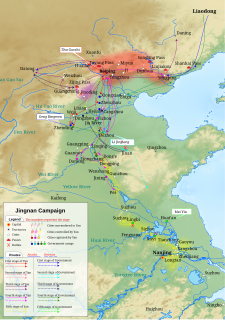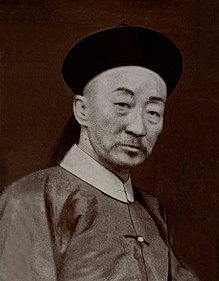The New Armies, more fully called the Newly Created Army, was the modernized army corps formed under the Qing dynasty in December 1895, following its defeat in the First Sino-Japanese War. It was envisioned as militia fully trained and equipped according to Western standards.

Yixin, better known in English as Prince Kung or Gong, was an imperial prince of the Aisin Gioro clan and an important statesman of the Manchu-led Qing dynasty in China. He was a regent of the empire from 1861 to 1865 and wielded great influence at other times as well.
Hešeri, is a Manchu clan with Jianzhou Jurchens roots, originally hailing from the area which is now the modern Chinese provinces of Jilin and Liaoning. It was once one of the most important and powerful families in the early Qing dynasty in China, second only to the royal House of Aisin Gioro, to whom they were closely related by marriage. The power of the family reached its zenith in the period of Marquess Hešeri Sonin and his second son Duke Hešeri Songgotu. Although its influence declined following Songgotu's death, clan Hešeri continued to play a role in Chinese politics until the demise of the Qing dynasty in early 1912.
The Battle of Jieqiao, also known as the Battle of Jie Bridge, was fought between the warlords Yuan Shao and Gongsun Zan in 191 in the late Eastern Han dynasty. It was the first significant clash of arms between the rival warlords in the contest for dominion of Ji and Qing provinces in northern China. The site of the battle is generally considered to be a site east of Guangzong County, Julu Commandery.

The Green Standard Army was the name of a category of military units under the control of Qing dynasty China. It was made up mostly of ethnic Han soldiers and operated concurrently with the Manchu-Mongol-Han Eight Banner armies. In areas with a high concentration of Hui people, Muslims served as soldiers in the Green Standard Army. After the Qing consolidated control over China, the Green Standard Army was primarily used as a police force.

Zongdu, usually translated as Viceroy or Governor-General, governed one or more provinces of China during the Ming and Qing dynasties.
Longkodo was an eminent Manchu court official who lived in the Qing dynasty. He was from the Tunggiya clan, which was under the Bordered Yellow Banner. His period of fame lasted from the late Kangxi era to the early Yongzheng era, perhaps most famous for delivering the Kangxi Emperor's disputed will.
Huo Yi, courtesy name Shaoxian, was a military general of the state of Shu Han in the Three Kingdoms period of China. His father, Huo Jun, served under Liu Bei, the founding emperor of Shu. During his service under the Shu emperor Liu Shan, Huo Yi suppressed tribal rebellions in the restive Nanzhong region and maintained peace in the area. After Shu was conquered by its rival state Cao Wei in 263, Huo Yi surrendered to the Wei regime and was permitted to remain in charge of keeping the peace in Nanzhong. In return, Huo Yi became a Wei subject and presumably continued serving under the Jin dynasty, which replaced the Wei regime in 265.
Yishan, courtesy name Jingxuan, was a Manchu lesser noble and official of the Qing dynasty. He is best known for his failure to defend Guangzhou (Canton) from British forces during the First Opium War, and for signing the treaties of Kulja and Aigun with the Russian Empire in 1851 and 1858 respectively.
The Imperial Household Department was an institution of the Qing dynasty of China. Its primary purpose was to manage the internal affairs of the Qing imperial family and the activities of the inner palace, but it also played an important role in Qing relations with Tibet and Mongolia, engaged in trading activities, managed textile factories in the Jiangnan region, and even published books.

The Shenjiying was one of three elite military divisions stationed around Beijing during the Ming dynasty. Its name has been variously rendered as Firearms Division, Artillery Camp, Shen-chi Camp,Firearm Brigade, and Divine Engine Division.

Jingnan Campaign, or Jingnan Rebellion, was a civil war in the early years of the Ming dynasty of China between the Jianwen Emperor and his uncle Zhu Di, the Prince of Yan. It started in 1399 and lasted for three years. The campaign ended after the forces of the Prince of Yan captured the imperial capital Nanjing. The fall of Nanjing was followed by the demise of Jianwen Emperor, and Zhu Di was crowned the Yongle Emperor.

The flag of the Qing dynasty was an emblem adopted in the late 19th century featuring the Azure Dragon on a plain yellow field with the red flaming pearl of the three-legged crow in the upper left corner. It became the first national flag of China and is usually referred to as the "Yellow Dragon Flag".

The Wuwei Corps or Guards Army was a modernised army unit of the Qing dynasty. Made up of infantry, cavalry and artillery, it was formed in May or June 1899 and trained by western military advisers. The guard took responsibility for the security of Peking (Beijing) and the Forbidden City, with Ronglu as its supreme commander. This move was an attempt by the Qing imperial court to create a western-style army equipped with modern weaponry following the Qing Empire's defeat in the First Sino-Japanese War. Three out of the five divisions of the Wuwei Corps were disbanded after two years due to attrition caused by the Boxer Rebellion.

Yin Chang or Yin-ch'ang (1859–1928) was a military official, ambassador to Germany, and educational reformer in the Qing Dynasty and the Republic of China. He was appointed the nation's first Minister of War in the late Qing Dynasty. Later he also became the military Chief of Staff in the Beiyang Government. He was ethnic Manchu, and his family belonged to the Plain White Banner Clan of the Manchu Military Organization (滿洲正白旗); he held the title of Prince of that clan; at court he was addressed as Wu-lou.

The Qing dynasty (1636–1912) was established by conquest and maintained by armed force. The founding emperors personally organized and led the armies, and the continued cultural and political legitimacy of the dynasty depended on the ability to defend the country from invasion and expand its territory. Therefore, military institutions, leadership, and finance were fundamental to the dynasty's initial success and ultimate decay. The early military system centered on the Eight Banners, a hybrid institution that also played social, economic, and political roles. The Banner system was developed on an informal basis as early as 1601, and formally established in 1615 by Jurchen leader Nurhaci (1559–1626), the retrospectively recognized founder of the Qing. His son Hong Taiji (1592–1643), who renamed the Jurchens "Manchus," created eight Mongol banners to mirror the Manchu ones and eight "Han-martial" banners manned by Chinese who surrendered to the Qing before the full-fledged conquest of China proper began in 1644. After 1644, the Ming Chinese troops that surrendered to the Qing were integrated into the Green Standard Army, a corps that eventually outnumbered the Banners by three to one.
Shuntian Prefecture was an administrative region of China during the Ming and Qing dynasties, equivalent to Beijing Municipality in today's People's Republic of China. However, the area of the prefecture jurisdiction was different. The term Shuntian fu also referred to the yamen (office) of the prefecture's local government.

Oros Niru was a Manchu military unit of Qing dynasty China. It consisted of Russian Cossacks that were captured during the border conflicts between the Russian empire and Qing China. Formally, this niru was known as the 17th niru of the 4th jalan of the Manju Gusa ejen of Bordered Yellow Banner(鑲黃旗滿洲都統第四參領第十七佐領).
Succession War is Hong Kong historical drama created and produced by Chong Wai-kin for TVB, starring Ruco Chan, Natalie Tong and Shaun Tam as the main leads. The show is a fictional biography story about the last 28 days of the life of Qing dynasty court official Heshen, who is known for being the most corrupt court official in Chinese history. Succession War premiered on 25 June 2018 on TVB Jade.


















